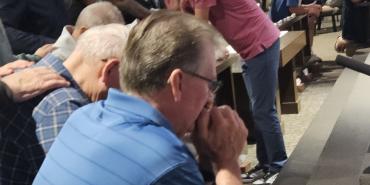Hope and Courage in a Time of Change

As a writer, I am keenly interested in the words other writers use as they approach the task of communicating their message to readers. The choice of words is much like the photo editor's choice of photographs used to identify, illustrate, or embellish a written piece.
The words and pictures presently being used by the public media do much to communicate as well as interpret the drama of everyday life. And we are right in the middle of a global drama that is most unusual. It is a drama that engulfs the whole world on every front: environmental, political, and financial.
The daily narratives of global financial dislocation are punctuated by the frequent use of terms designed to communicate the direst of situations. Add to this the stories of "wars and rumors of wars" and the diverse elements begin to take shape in a panorama of convulsive change.
As I write this, here are just a few of the phrases I've read recently in major publications:
- Rapid deterioration
- Missing expectations
- Hit hard
- Unexpected losses
- Outrage
- Unnatural disasters
- Sales plunge
- Tens of thousands of troops deployed
And those are just the terms used to describe the geopolitical and business scene. If we add to this list the adjectives used to describe the scandals surrounding political nominees for important positions in the U.S. government, it is easy to get the big picture. We are in a time of turmoil.
It is tempting to add colorful adjectives such as "unprecedented" or "unique" to this list. However, it is clear that both the nations of the world and the arena of global business have experienced other times of stress and difficulty that might fit such descriptions. In every case, change arrived at the curve of crisis, and the human journey continued.
In this issue of Holiness Today, Al Truesdale offers poignant insights into the matter of living in an age of convulsive change and moral decay. Les and Leslie Parrott call attention to the problem of marrying for all the wrong reasons. General Superintendent James H. Diehl writes about finishing well. These and other articles await your reading and reflection. Each of them offers hope, guidance, and encouragement for navigating the floodwaters of crisis and the ever-accelerating pace of change.
On a personal note, readers lost a wonderful friend, general superintendent emeritus, and former editor of the Herald of Holiness (a forerunner of Holiness Today) with the passing of John A. Knight. He was a special friend and mentor to me. His holiness preaching, self-deprecating humor, and unflappable calm endeared him to everyone he met.
In 1985, at the general assembly in Anaheim, California, I was seated where John A. Knight was in my immediate view. When he was elected general superintendent, his head simply dropped in that typical posture of gracious humility as he recognized the call of God through the voice of the church. That humility was so characteristic of him. Anecdotes about his life and ministry could fill this issue.
We will miss you, Dr. John. Our thoughts and prayers are with Justine and the family as we say farewell, knowing that we shall meet him in the morning!
David J. Felter, editor in chief
Please note: All facts, figures, and titles were accurate to the best of our knowledge at the time of original publication but may have since changed.




